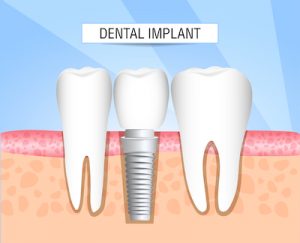If you haven’t had any severe dental-related issues in the past few years, you might be under the impression that oral health doesn’t change much over time. It’s a common misconception, because after all, your yearly checkup and cleaning probably hasn’t changed much, if at all. There is the usual round of X-rays, the exam, and then, of course, the cleaning.
But the truth is that dentistry is a field that is evolving all the time, and your dentist at Anchorage Dental Group is constantly expanding their education and learning about more innovative and advanced techniques as they are developed. After all, the goal of good dentistry is to be able to effectively and efficiently solve your dental issues with the least impact on your overall health.
On that note, one of the most exciting advances in dental medicine over the past few years is the dental implant—and these oral innovations are getting better all the time. If you have missing teeth and you have considered dentures, bridges, or other procedures to offset your tooth loss, you should absolutely consider dental implants.

Dental implants refer to a very specific type of prosthetic; that is, one which mimics not only the appearance of a natural tooth, but also its function. Furthermore, dental implants have numerous benefits over other types of dental replacement procedures. Instead of being a removable replacement, like dentures, or one which depends on attachment to adjacent teeth, like bridges, a dental implant closely mimics the way a natural tooth is attached to your jaw.
You see, dental implants start with a titanium post being surgically implanted in your jawbone. The fact that it is titanium is important, because this material is uniquely suited to bonding with bone, thus creating a reliable, stable, long-term foundation. This post extends above your gum, and the replacement tooth can be attached to it. So even if your replacement tooth needs to be replaced again in the future, the post remains.
In recent years, this method of tooth replacement has become the most popular option for a number of reasons—first and foremost because it’s the most organic method for replacing a tooth. The result is fully functional and practically undetectable.
There are three major benefits of choosing dental implants over other replacement methods: overall oral health, versatility, and functionality.
Dental implants, once they have fused with the bone, act very similarly to the way the roots of your natural teeth act.
Also, other replacement methods often negatively impact the surrounding teeth, resulting in wear and tear on your remaining healthy teeth. Bridges, for example, often require that surrounding teeth be filed down to accommodate the bridge.
Dentures can harbor bacteria, and their fit degrades as the years pass; even when they fit well, they can rub, chafe, and cause sore areas—areas that are ripe for infection. Implants are practically indistinguishable from natural teeth and have none of these drawbacks. Once the titanium post is implanted, there’s no need for further invasive procedures.
With other dental replacement methods, there are numerous factors that are considered to determine whether or it can be used in your individual case. A single lost tooth can’t really be replaced via dentures, while too many lost teeth can’t be replaced using a bridge.
Dental implants, on the other hand, can be used to replace one tooth, or many, with essentially no limit, so long as you haven’t suffered extensive bone loss in your jaw. Furthermore, the surrounding teeth don’t need to be adjusted or filed, as with some other replacement methods. Finally, dentures, bridges, and veneers all have a relatively short life: 5-10 years. Using them past that point, or not getting them replaced, can have negative effects on your mouth.
But dental implants are likely to remain functional for the rest of your life. Even if you require a replacement, it’s likely only to be the replacement “tooth,” not the implanted titanium rod.
There’s no question that implants outperform dentures and other replacement techniques. Dentures, for example, can cause slurred speech, as well as difficulty chewing and eating, completely ruling out certain foods. And as mentioned, they can degrade in their fit and rub against your gums and other teeth, causing wear and and sore spots.
Generally speaking, a dental implant has all of the functionality of a natural tooth, and none of the drawbacks of bridges, dentures, or other replacement methods.
Of course, there are issues which can prevent a patient from being a good candidate for dental implants. If you think that a dental implant might be right for you, contact us today! We’ll be happy to schedule a consultation to discuss your tooth replacement options.
Essentially, the process of getting dental implants involves two stages. In the first stage, the dentist will surgically implant a small titanium post directly into your jawbone. Titanium is chosen because, unlike other metals, it is able to fuse with your bone over time. That’s why you often hear about people who have, for example, titanium screws in their bones to help them heal from major bone trauma.
Just as titanium can be used for that purpose, it’s also ideal for dental implants. This discovery has revolutionized the way the dental field treats replacements.
Once the bone heals around the titanium post, an “abutment” is screwed onto this post. This abutment can replace one single tooth, or several.
Dental implants may be somewhat more expensive up front as compared to other replacement options. However, dental implants are often effectively a life-long replacement, as compared to dentures or bridges. You can discuss the various factors that might contribute to the short or long term costs of different replacement options with your dentist. If you think you’re a good candidate for dental implants, or another replacement option, call today!